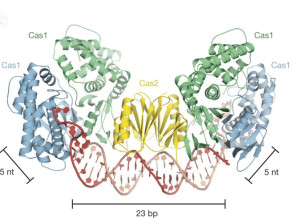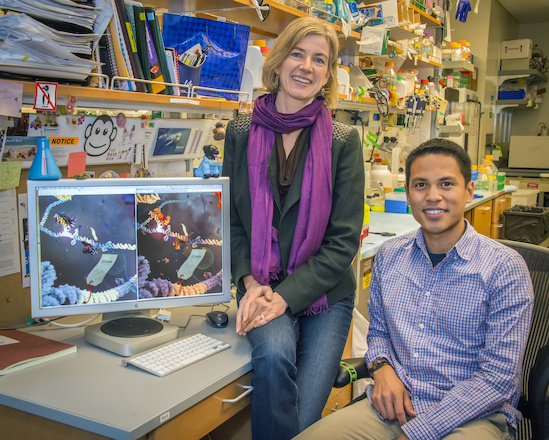Jennifer Doudna and James Nunez led a study at the Advanced Light Source that revealed the structural basis by which bacteria are able to capture genetic information from viruses and other foreign invaders for their own immunological system. This discovery holds promise for studying or correcting problems in human genomes.
 The CRISPR/Cas9 protein system, which is central part to bacterial adaptive immunity, has soared to great prominence in recent years for its enormous potential as a genome editing tool. In studying this system, scientists have found it to be akin to a Russian doll in that the unlocking of one secret reveals another secret within. Jennifer Doudna, a biochemist with Berkeley Lab’s Molecular Biophysics and Integrated Bioimaging (MBIB) division, who has been at the forefront of unlocking CRISPR/Cas secrets has just unlocked another. Working off data acquired at the Advanced Light Source, Doudna and her research group have discovered the structural basis by which bacteria are able to capture genetic information from viruses and other foreign invaders for use in their own immunological system. Read more at the Berkeley Lab News Center.
The CRISPR/Cas9 protein system, which is central part to bacterial adaptive immunity, has soared to great prominence in recent years for its enormous potential as a genome editing tool. In studying this system, scientists have found it to be akin to a Russian doll in that the unlocking of one secret reveals another secret within. Jennifer Doudna, a biochemist with Berkeley Lab’s Molecular Biophysics and Integrated Bioimaging (MBIB) division, who has been at the forefront of unlocking CRISPR/Cas secrets has just unlocked another. Working off data acquired at the Advanced Light Source, Doudna and her research group have discovered the structural basis by which bacteria are able to capture genetic information from viruses and other foreign invaders for use in their own immunological system. Read more at the Berkeley Lab News Center.




